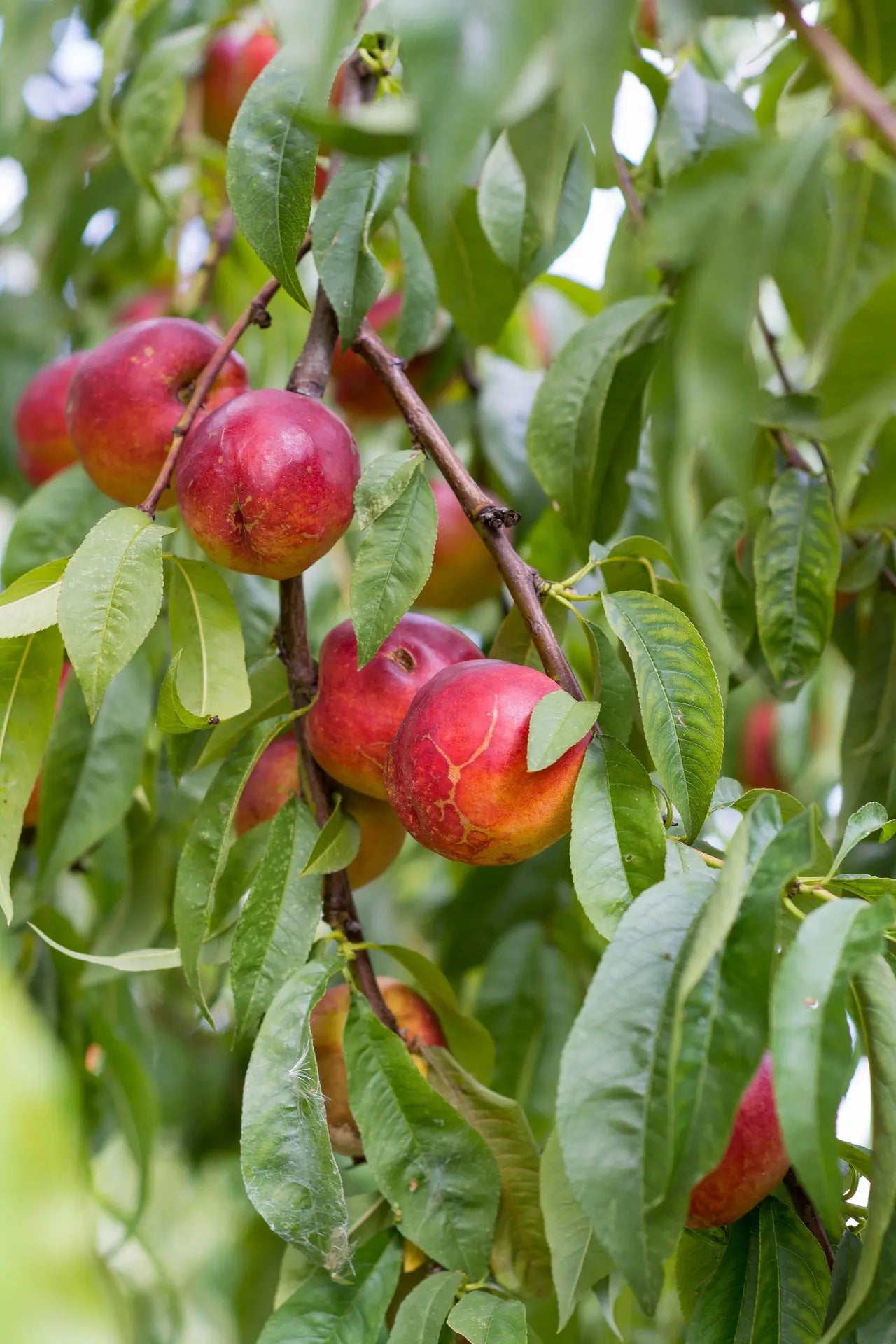-
Delivery from 10 plants to France, Switzerland and Europe
Delivery method -
Fruit Tree Wholesale Supplier
About Us -
Quality Fruit Tree Plants
Technical itinerary
Sekoya-cov White Flesh Flat Nectarine Tree grafted on PR-R/Mirared 1L pot
Sekoya-cov White Flesh Flat Nectarine Tree grafted on PR-R/Mirared 1L pot
The prices shown are our base prices for large volumes. Depending on the quantity ordered and the producers’ pricing scales, the rate may be adjusted upward. Each quote is personalized to ensure you receive a fair price.
Mini order 50 units / Multiple orders 10 units (FRSHER202503001)
Couldn't load pickup availability
 Buy now and get it delivered when you're ready to plant - Add your desired date to your quote request
Buy now and get it delivered when you're ready to plant - Add your desired date to your quote request
- Delivery from 10 plants to France, Switzerland and Europe

Technical sheet of the Nectarine variety, flat fruit, white flesh, Sekoya-cov
- Fruit flesh color: White
- Skin color: Intense red over 100% of the surface
- Size and Shape: Medium to large (BA size), flat ("bagel-like")
- Tree Size: Normal vigor, semi-open habit
- Fruit maturity: About 5 days after the Samantha-cov variety
- Fruit taste: Excellent organoleptic qualities. Potentially juicy and sweet flesh (characteristic of white nectarines). Very good firmness.
- Earliness of the variety: Early
- Fruiting period Late June to early July (estimate for an early variety ripening late June/early July)
- Disease resistance and storage: Very low rate of fruit cracking. Very good firmness, suggesting good storage potential. Disease resistance not specified.
- Variety yield: Very good, high production every year
- Commercial use: Early variety with good presentation, excellent firmness and low cracking rate, suitable for fresh marketing.
- Is this a COV variety? Yes (CPVO patented)
- Comments: Very good flowering. Interesting early variety for the start of the flat nectarine season.
Quick read / the essentials on Nectarinier Sekoya-cov
The Sekoya-cov variety is a flat, white-fleshed nectarine developed by the Spanish breeder PSB Producción Vegetal, renowned for its precocity, strong visual appeal, and ability to meet the demands of the fresh market. With a Plant Variety Certificate (PVC), it is aimed at professional producers looking to integrate a competitive, high-performance variety suitable for high-end marketing from the beginning of summer.
The B/A size fruits, with their characteristic flat shape and intense red skin covering the entire fruit, stand out for their uniform presentation and strong firmness. These characteristics facilitate packaging and marketing, even in long supply chains. With maturity positioned around early to mid-July, approximately five days after Samantha-cov, Sekoya-cov offers a strategic harvest window.
To successfully integrate this variety, Arboriverse, a specialist wholesale supplier of nectarine plants , provides arborists with quality, certified plants and advice adapted to the local soil and climate context. The variety has a semi-open tree shape, moderate vigor, with a high and regular annual production. Its very early flowering requires vigilance in areas at risk of spring frost, but allows a head start on the competition.
Buying Sekoya-cov nectarine plants through Arboriverse means benefiting from the expertise of a recognized partner in the fruit industry. Compatible rootstocks such as GF 677, Cadaman or Garnem are available to adjust orchard management according to soil type and agronomic objectives. As a specialist wholesale supplier of nectarine plants , Arboriverse guarantees personalized support to buy Sekoya-cov nectarine plants under the best conditions.
By choosing Arboriverse, a specialist wholesale supplier of nectarine plants , you are investing in a reliable, efficient solution adapted to the technical realities of the field. Buying Sekoya-cov nectarine plants means securing your orchard with a modern, competitive variety sought after by specialist distribution channels.
Presentation of the flat white-fleshed nectarine variety Sekoya-cov
Sekoya-cov is a recent variety of flat nectarine with white flesh , selected by PSB Producción Vegetal , a Spanish breeder renowned for its work on stone fruits. This variety is protected by a Plant Variety Certificate (PVC) , which regulates its propagation and marketing. It is distinguished by its precocity , its remarkable visual presentation , and its good suitability for the fresh market .
Fruit characteristics
Sekoya-cov fruits have white flesh , prized for its sweetness and juicy texture . Although organoleptic details are not specified, white-fleshed flat nectarines are generally less acidic and more fragrant than their yellow-fleshed counterparts, making them a popular choice among consumers.
The size of the fruit is between B and A , which corresponds to a medium to large size , in line with commercial standards. The flat shape of the fruit, characteristic of the "donut" type, particularly attracts niche or specialized markets.
The intense red skin , which covers 100% of the surface , constitutes an aesthetic and commercial advantage , allowing an attractive marketing without complex sorting. The high firmness of the fruit promotes good post-harvest holding and easy handling , even for long circuits. In addition, the variety is known to have a low cracking rate , an important asset to limit pre- or post-harvest losses.
Earliness and harvest period
Sekoya-cov is an early variety, with an estimated maturity around 5 days after Samantha-cov . This positions its harvest around early to mid-July , depending on regional climatic conditions. Its very early flowering , around 20 days before Samantha-cov , may require special vigilance in areas sensitive to spring frosts .
This precocity allows producers to anticipate marketing compared to more classic varieties, a strategic advantage in a context of seasonal commercial pressure .
Tree characteristics
The tree has normal vigor with a semi-open habit , facilitating the management of the plant cover and the penetration of light, favorable to the quality of the fruits. It is described as having abundant flowering and high production each year , testifying to its regularity in the orchard .
Sekoya-cov is self-fertile , meaning it can produce fruit without requiring the presence of specific pollinators. However, as with all self-fertile varieties, coexistence with other compatible varieties can further improve cross-pollination and overall yield .
Agronomic sensitivities and requirements
No specific data are available on disease resistance for this variety. However, as a nectarine tree , it is likely susceptible to common diseases such as peach leaf curl , powdery mildew , and brown rot . Preventive plant protection strategies and a regular monitoring schedule are recommended.
Concerning pests , nectarine trees are often subject to attacks by aphids , scale insects , or even the Mediterranean fruit fly . No specific resistance is indicated for Sekoya-cov, which justifies the implementation of integrated pest management measures.
No specific information is given on drought resistance , lime tolerance or susceptibility to root asphyxiation . However, as with most nectarine trees, well-drained soil and regular watering , especially during fruit set, are recommended.
Compatible and recommended rootstocks
No specific recommendations are given for Sekoya-cov, but several standard rootstocks can be considered depending on soil and climate conditions:
- GF 677 : suitable for calcareous soils and dry conditions , widely used in France.
- Cadaman : resistant to root asphyxiation , for heavy or humid soils .
- Montclar : for light and acidic soils , good vigor.
- Garnem : resistant to nematodes , well suited to replanting .
The choice of rootstock will influence vigor, productivity, and adaptation to the soil. It is therefore essential to consult a nurseryman or local technician to make a choice adapted to the context of the operation.
Performance and business potential
The exact yield in kilograms per tree is not specified, but the very good production mentioned in the sources suggests a high potential , probably between 25 and 35 kg per adult tree , depending on cultivation practices.
The fruit 's good condition, its remarkable visual presentation and its distinctive flat shape make it a highly valuable product for the fresh market, particularly in specialist or high-end channels. Its precocity also allows it to stay ahead of the competition , a strategic factor at the start of the season.
Legal status and precautions
Sekoya-cov is a variety protected under CPVO patent n°2023/2262 . Its cultivation and marketing require compliance with breeder's rights , possibly with a license contract and the payment of royalties . It is imperative to inquire about the legal conditions before any commercial exploitation.
Recommendations and next steps
Sekoya-cov appears to be a rising star in the flat nectarine segment. It combines precocity, firmness, regularity of production and visual quality , meeting the expectations of the current market. To integrate this variety into your orchard, it is recommended to:
- Consult a licensed nurseryman to verify licensed availability.
- Request a technical sheet from PSB Producción Vegetal or its distributor.
- Evaluate specific agronomic needs (rootstock, management, treatments) based on your region.
- Plan a suitable cultivation and phytosanitary protection plan .
Sekoya-cov can be a relevant choice for nectarine producers looking for differentiation , high yield and early marketing .
To summarize: Nectarinier Sekoya-cov
With Sekoya-cov , growers gain access to a flat, white-fleshed nectarine with high commercial potential. Protected by a VOC, this variety combines excellent presentation – intense red skin, regular shape – and good firmness, ensuring optimal shelf life until the point of sale. Its early maturity, just after Samantha-cov, gives it a strategic advantage on summer markets. Its moderately vigorous tree with abundant flowering ensures stable and high production, year after year.
To assist arborists in their choice, Arboriverse, a specialist wholesale supplier of nectarine plants , offers certified Sekoya-cov plants, with a wide range of rootstocks to adapt to regional specificities. GF 677, Cadaman or Garnem are all technical options that Arboriverse, a specialist wholesale supplier of nectarine plants , can recommend depending on the nature of the soil and the orchard management objectives.
Purchasing Sekoya-cov nectarine plants allows you to position yourself in a qualitative, differentiated, and profitable niche. Thanks to its strong visual appeal, good post-harvest handling, and low cracking rate, this variety perfectly meets the expectations of the premium market and direct sales. Buying Sekoya-cov nectarine plants from Arboriverse means benefiting from expert advice, reliable logistics, and a lasting partnership to secure the establishment of your orchard.
With Arboriverse, a specialist wholesale supplier of nectarine plants , producers have a single point of contact for every stage of their project. Whether you are in the process of varietal conversion or creating an orchard, you can buy Sekoya-cov nectarine plants with complete confidence, with the assurance of rigorous technical monitoring and plant quality that meets professional standards. Choose performance with Arboriverse, a specialist wholesale supplier of nectarine plants , to buy Sekoya-cov nectarine plants under the best market conditions.
-
Sekoya-cov White Flesh Flat Nectarine Tree grafted on Garnem bare-root 100-120 cm
Regular price €5,95 EURRegular priceUnit price / per -
Sekoya-cov White Flesh Flat Nectarine Tree grafted on RP-40 bare-root 100-120 cm
Regular price €6,55 EURRegular priceUnit price / per -
Sekoya-cov White Flesh Flat Nectarine Tree grafted on PR-R/Mirared bare-root 100-120 cm
Regular price €6,15 EURRegular priceUnit price / per -
Sekoya-cov White Flesh Flat Nectarine Tree grafted on GF677 and Mirab.29-C bare-root 100-120 cm
Regular price €5,75 EURRegular priceUnit price / per -
Sekoya-cov White Flesh Flat Nectarine Tree grafted on Garnem 1L pot
Regular price €6,25 EURRegular priceUnit price / per -
Sekoya-cov White Flesh Flat Nectarine Tree grafted on RP-40 1L pot
Regular price €6,85 EURRegular priceUnit price / per



